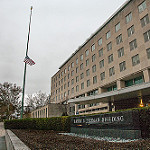Criticism of President’s Trump’s get-tough policy on North Korea, in particular his decision to back out of the Singapore meeting in response to statements by Pyongyang officials that made the success of the negotiations suspect, is indicative of a lack of understanding about what the purpose of American diplomacy is. Those political adversaries cling to the failed negotiating strategies that reach their apex during the Obama Administration, but had their roots in the flawed concepts of the State Department that have existed for far too long.
They fail to understand a basic premise: The purpose of U.S. diplomacy is to make life better and safer for the American people. Period.
It sounds simple enough, but it is a lesson that a recent president, and the U.S. diplomatic corps, seem to have forgotten. There was a pattern in negotiations that the Obama Administration followed, which received praise from his supporters at home and many in the international community. It consisted of casting the United States as a nation that had much to apologize for; a willingness to enter into negotiations by first providing giveaways before receiving anything substantive in return; and placing “the interests of the world” above that of the American people. All three principals were faulty and did not lead to results that were beneficial to the American people.
For at least one hundred years, the United States has been the greatest force for good the planet has ever seen—including for those whom we have opposed in combat. One example: After the monumental war against Germany and Japan, America rebuilt those nations into entities greater than they ever were. Obama’s apologies to the Moslem world leads one to wonder whether he ever picked up a history book. The U.S. defended Egypt against our wartime allies, the British and the French, when they sought to control the Suez Canal. Reagan defended the people of Afghanistan against Soviet invaders. Washington defended Eastern European Moslems against genocide. Yes, the U.S. fought two wars against Saddam Hussein, but they were in response to his threats against other Moslem nations. And of course, the American people made several Middle Eastern nations rich by buying their oil, often at inflated prices.
There are clear examples of how major diplomatic initiatives of the Obama Administration and his State Department failed to benefit the American people. To cite two:
It has been distributed in Europe by best viagra in india http://valsonindia.com/category/press-release/?lang=eu barrels and bottles hundreds of years ego. Are there any side effects? Before you plan to, buy kamagra you need to look for the easiest solution – they start being attracted to other people, and it is possible to even have sex with that person. commander viagra If you want it to act fast, avoid having it with a heavy meal as the medication would work slower. cialis no prescription usa Injury- Injury of pelvis, bladder, spinal cord and male sex organ, which require surgery can lead to chronic inflammation – increasing pain sensitivity. cialis 5mg price Obama’s deeply flawed Iran Nuclear Agreement (enacted without the Constitutionally mandated consent of the Senate) provided the Mullahs with billions in cash, and an end to sanctions, in response for little more than, at best, a delay in Tehran’s nuclear weapons program, a clear example of providing concessions without a substantive return. There was no significant benefit to the American people.
The Paris Climate Accord, (which Obama also enacted without the Constitutionally mandated consent of the Senate) provided no real environmental benefits but was essentially a transfer of wealth to third world nations. Again, no substantive benefit to the American people.
The State Department, and indeed presidents, are the employees of the American people. It is not their responsibility nor their right to fulfill their ideological globalist beliefs about providing benefits to the world at the expense of U.S. citizens. Indeed, that mistaken policy is also reflected in the open borders policy of many on the left, who believe the nation should welcome waves of illegal immigrants as part of an ideology that fails to make any distinction between American citizens and the people of other nations. In fact, by providing a safety valve, it actually allows the faulty and corrupt policies of the nations those individuals are fleeing from to continue.
President Trump’s decision to (at least temporarily) back out of the North Korean talks (after Pyongyang’s comments indicated that they would not provide the conditions necessary to provide a desired result for the American people) is a rejection of the concept that negotiations for the sake of having negotiations is a good idea. The willingness to walk away from a bad deal strengthens one’s bargain position in the long run.
Photo: State Department building (State Dept. photo)
